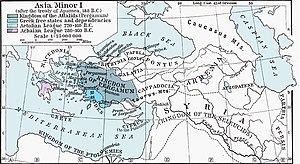Roman-Seleucid War
| Roman–Seleucid War | |||||||||
|---|---|---|---|---|---|---|---|---|---|
| Part of the Macedonian Wars | |||||||||
 Map of Asia Minor and the general region after the war. |
|||||||||
|
|||||||||
| Belligerents | |||||||||
|
Seleucid Empire Aetolian League Athamania Cappadocia |
Roman Republic Achaean League Macedonia Pergamon Rhodes |
||||||||
| Commanders and leaders | |||||||||
|
Antiochus III the Great Hannibal |
Aemilius Regillus Scipio Asiaticus Eumenes II of Pergamum Philip V of Macedon Scipio Africanus |
||||||||
The Roman–Seleucid War (192–188 BC), also known as the War of Antiochos or the Syrian War, was a military conflict between two coalitions led by the Roman Republic and the Seleucid Empire. The fighting took place in Greece, the Aegean Sea and Asia Minor.
The war was the consequence of a "cold war" between both powers, which had started in 196 BC. In this period Romans and Seleucids had tried to settle spheres of influence by making alliances with the Greek minor powers.
The fighting ended with a clear Roman victory. In the Treaty of Apamea the Seleucids were forced to give up Asia Minor, which fell to Roman allies. As a main result of the war the Roman Republic gained hegemony over Greece and Asia Minor, and became the only remaining major power around the Mediterranean Sea.
Antiochus III the Great, the Seleucid Emperor, first became involved with Greece when he signed an alliance with King Philip V of Macedon in 203 BC. The treaty stated that Antiochus and Philip would help each other conquer the lands of the young Ptolemaic pharaoh, Ptolemy V.
In 200 BC, Rome first became involved in the affairs of Greece, when two of its allies, Pergamum and Rhodes, who had been fighting Philip in the Cretan War, appealed to the Romans for help. In response to this appeal the Romans sent an army to Greece and attacked Macedon. The Second Macedonian War lasted until 196 BC, and it effectively ended when the Romans and their allies, including the Aetolian League, defeated Philip at the Battle of Cynoscephalae. The treaty's terms forced Philip to pay a war indemnity and become a Roman ally while Rome occupied some areas of Greece.
...
Wikipedia
